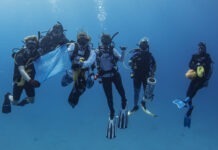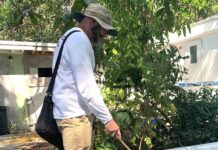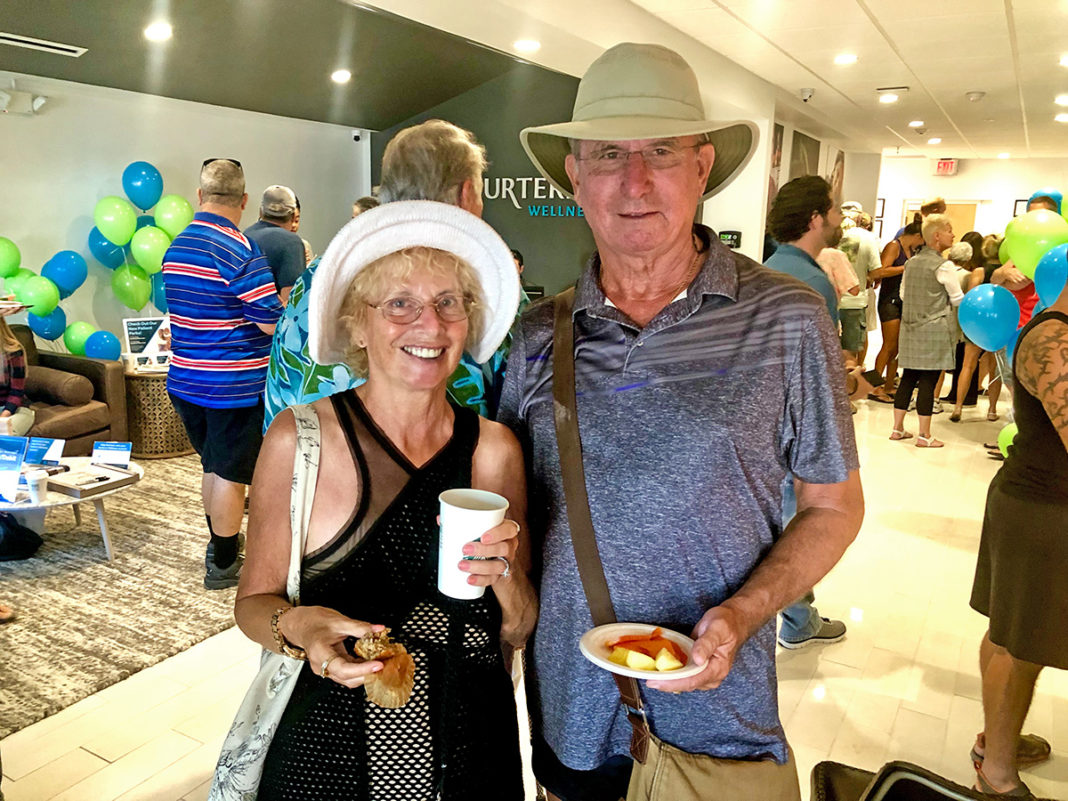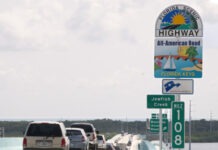Legalization of medical marijuana was voted into Florida law on Nov. 8, 2016, and the changes have happened fast. Since then, 116 dispensaries have opened statewide, all operated by the 12 parent companies licensed by the Florida Department of Health. On March 18, Governor Ron DeSantis signed Senate Bill 182, allowing a physician to “determine that smoking is an appropriate route of administration for medical marijuana,” aka making smoking cannabis is legal for patients for the first time. Last but certainly not least: Monroe County’s first medical marijuana treatment facility had its grand opening on April 11.
Surterra Wellness is located at 3126 Flagler Ave in Key West. The space is reminiscent of a spa, with multiple seating areas, soothing music and staff at the ready to assist patients. Surterra is open to the public—you don’t have to have a medical marijuana card to take a peek at the offerings or have a consultation, but you do need one to purchase any of their cannabis products. Surterra also has a list of doctors to refer patients to (See box opposite page).
Surterra’s chief marketing officer, Levent Hamdemir, visited Key West to take part in the ribbon-cutting and explain the role of cannabis — in many forms — in patients’ lives. Patients were lined up for consultations and, ultimately, purchase.
“Every year, we are expanding the scope,” said Hamdemir. “One of the interesting challenges that we see is that, unlike traditional pharmaceuticals that have one active ingredient treating a symptom, all of our products are helping your body deal with life and your environment better.” Hamdemir cites the holistic nature of medical cannabis treatment: as an anti-inflammatory, hormone regulator, anxiety reducer and seizure treatment.
Hamdemir said that while cannabis is normally organized by strains, those monikers tell a patient very little about the plant’s specific health benefits (it’s hard to know whether “Sour Diesel” or “Strawberry Fields” is better for joint pain). Surterra instead engineers products based on the symptoms or “needs” it is addressing, and each product is a blend of cannabinoids. They have names like “Calm,” “Soothe” and “Revive.” The products incorporate THC (tetrahydrocannabinol) and CBD (cannabidiol) in different percentages; the former creates the euphoric feeling associated with marijuana, while the latter has no such effect.
How do they isolate strains and create formulas that address certain medical concerns?
Their research and development team works with physicians and looks at the more than 100 cannabinoids in the plant. While only a handful have a euphoric impact, they all potentially have different health effects.
“We just recently acquired a new division of scientists based out of Boston,” Hamdemir said, “and we are competitively invested in research and development.” While cannabis is still federally illegal, however, scientists studying the effects of the plant can’t receive federal funding, and thus there is limited science based in the U.S. Surterra is looking at research from elsewhere, like Israel.
While U.S.-based research is limited, last June, the FDA approved a cannabis-based epilepsy drug called Epidiolex, and it’s the first FDA-approved substance that is derived from the marijuana plant. This makes companies like Surterra hopeful, which also has divisions that work with policy makers to move medical marijuana legislation ahead.
The federal law isn’t stopping the science, or the business, from progressing.
While Surterra is the first dispensary to open its doors in the Keys, there are two more on the horizon in Key West. Jeff Burgess, chief licensing official for the City of Key West, said MedMen on Duval Street has already registered and paid its city taxes, while another, Trulieve, has yet to apply for a city license.
“Licensing isn’t much different (from other retail spaces),” said Burgess. “The only thing that’s different is that they have to be listed on the Department of Health website. The Department of Health authorizes the companies, and they can have x number of facilities throughout the state.”
This is new territory for doctors, too. Dr. Gregory Sonn prescribes legal forms of cannabinoids to patients who are seeking treatment for their pain and other medical issues. Sonn has offices in the Upper Keys and Key West, and he is the largest prescriber of medical marijuana in the state of Florida.
Some of the top ailments and complaints coming into his office include anxiety, depression, seizure and insomnia. Sonn is dually boarded in family practice and palliative medicine and has been prescribing medical marijuana since 2016. He said that prescribing medical marijuana is based on the doctor’s ability and knowledge.
“We are tasked with building our own bank of information,” he said. “We all have our own. I have 50 diagnoses who qualify. Some doctors may only have two.”
Obtaining a medical marijuana card isn’t complicated, Sonn said. First, people need to see a doctor who certifies the patient. Once patients get a diagnosis that’s deemed acceptable, they apply to the Florida Department of Health. Once the doctor and DOH give their approvals – it can take at least two weeks to obtain a card – patients can purchase medical marijuana products. Sonn said he lets patients freely choose the products they like. As for dispensaries, Sonn recommends trying them all.
“They all have initial patient discounts,” he said. “I always tell everybody you should get as much discount products as you can. Maybe you fall in love with a certain dispensary, maybe you don’t. But if someone has specific requests, I do have knowledge of every dispensary to deliver to make specific recommendations.”
The Florida Department of Health’s user-friendly website makes it easier for patients to find doctors and dispensaries, as well as review current legislation.
“We are in a transformative age,” said Hamdemir.
For more information, visit: http://www.flhealthsource.gov/ommu/
Doctors licensed to prescribe medical marijuana in Monroe County:
Key Largo: Frank Gudicello, Joanne Mahoney, Ian Rae, Gregory Sonn
Tavernier: Sandra Schwemmer
Ramrod Key: Gregory Keifer
Key West: Ioana Carabin, Robert Catana, Jennifer Charity, Julie Ann Floyd, Elias Gerth, Raymond McKnight, Jerry Jackson, Jessica Johnson, Langley, Joanne Mahoney, John Norris and Gregory Sonn.
Conditions that qualify patients for a medical marijuana prescription:
(from the Florida Department of Health)
- Cancer
- Epilepsy
- Glaucoma
- HIV
- AIDS
- Post-traumatic stress disorder (PTSD)
- Amyotrophic lateral sclerosis (ALS)
- Crohn’s disease
- Parkinson’s disease
- Multiple sclerosis (MS)
- Medical conditions of the same kind or class as or comparable to those above
- A terminal condition diagnosed by a physician other than the qualified physician issuing the physician certification
- Chronic nonmalignant pain caused by a qualifying medical condition or that originates from a qualifying medical condition and persists beyond the usual course of that qualifying medical condition
Forms of medical marijuana available:
Vaporizers — Inhaled form that offers fastest effect in shortest amount of time
Softgels or Theragels — Capsule form, like a pill or vitamin (filled with oil)
Tincture oils or sprays — Can be added to water or other liquids to be taken orally
Transdermal patches — Applied to the skin; may be prescribed for localized pain, may be prescribed for children
Herb or Flower — Bud of the marijuana plant in raw form, ingested by smoking, recently legalized at the state level for certain patients (not available at Surterra)



















